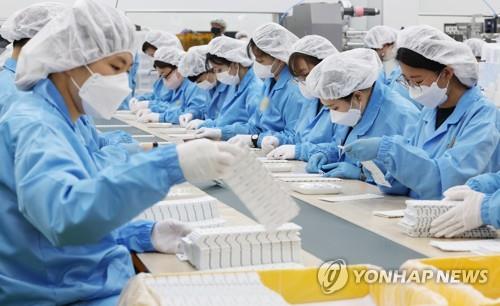- S. Korea unveils first graphic cigarette warnings
- US joins with South Korea, Japan in bid to deter North Korea
- LPGA golfer Chun In-gee finally back in action
- S. Korea won’t be top seed in final World Cup qualification round
- US men’s soccer misses 2nd straight Olympics
- US back on track in qualifying with 4-0 win over Guatemala
- High-intensity workout injuries spawn cottage industry
- CDC expands range of Zika mosquitoes into parts of Northeast
- Who knew? ‘The Walking Dead’ is helping families connect
- California Assembly OKs highest minimum wage in nation
S. Korea’s new COVID-19 cases over 50,000 for 2nd day amid raging omicron
South Korea’s daily COVID-19 infections stayed above 50,000 for the second day in a row Friday amid the fast spread of the highly transmissible omicron variant across the nation.
The country reported 53,926 new COVID-19 infections, including 53,797 local cases, raising the total to 1,239,287, according to the Korea Disease Control and Prevention Agency (KDCA).

Workers at a plant manufacture COVID-19 rapid antigen test kits in Chungju, 147 kilometers south of Seoul, on Feb. 11, 2021. (Yonhap)
It marks the second day in a row that the daily tally exceeded the 50,000 level. A daily record high of 54,122 was reported Thursday.
Friday’s tally is 1.97 times higher than the 27,438 reported a week earlier and 3.35 times higher than the 16,093 reported two weeks ago.
As of 6 p.m., the country had added 42,938 new COVID-19 cases, down 577 from the same time the previous day, according to health authorities and city governments. The greater Seoul area accounted for 62.9 percent.
Daily cases are counted until midnight and announced the following morning.
New infections have soared by nearly fourfold over the past two weeks due to the omicron variant, which accounted for more than 92 percent of the total cases reported last week.
The health authorities have warned that the figure could reach 170,000 by around the end of this month, though it is too early to say if it will be the peak of the omicron surge.
The National Institute of Mathematical Sciences, South Korea’s state-run think tank, estimated daily new cases could even reach a maximum of 360,000 by early next month.
The death toll from COVID-19 came to 7,012, up 49 from Thursday.
The number of critically ill COVID-19 patients was 271, down 11 from a day earlier, the KDCA said. The daily tally stayed in the 200′s range for 14 days in a row.
At-home patients increased to 177,014, up 2,837 from a day earlier, as more people have shown mild or no symptoms due to the omicron variant, according to the KDCA.
Starting Thursday, health authorities make daily checkup calls only to high-risk patients in a move to alleviate the workload of health workers and government officials, and to better deal with the current pandemic trends.
The high-risk group includes COVID-19 patients in their 60s and older, citizens in their 50s and with underlying health issues, and others with a compromised immune system.
Low-risk patients, those aged 50 or younger, are left to monitor their conditions by themselves and contact local hospitals if they worsen.
The authorities also hinted at adjusting the current toughened social distancing curbs earlier than scheduled. The current measures have been extended for two more weeks through Feb. 20.
Under the scheme, private gatherings of more than six people are banned and businesses are subject to a 9 p.m. curfew.
Of the locally transmitted cases, Gyeonggi Province that surrounds Seoul reported 17,925, followed by Seoul with 11,528 and the western port city of Incheon with 3,740, the KDCA said.
Daily new cases from overseas went up 41 from a day earlier to 129, it said.
As of Friday, 28.94 million people, or 56.4 percent of the country’s 52 million population, had received booster shots. The number of fully vaccinated people came to 44.18 million people, accounting for 86.1 percent.
Also, the government announced that it is considering placing a price ceiling on COVID-19 rapid antigen test kits as at-home testing and treatment has become a key element of the government’s COVID-19 response.
In an effort to ensure the stable supply of self-test kits, the government will also ban purchasing COVID-19 kits online starting Sunday.











